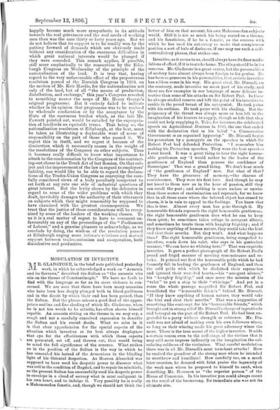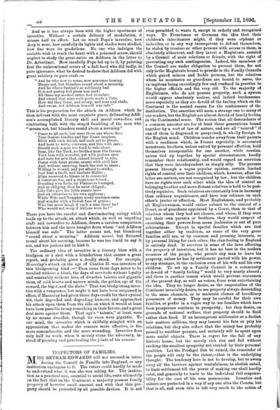MODULATION IN INVECTIVE j 4 R. GLADSTONE, in the brief
note published yesterday week, in which he acknowledged a work on "Armenia and its Sorrows," described the Sultan as "the assassin who sits on the throne of Constantinople." We have no fault to find with the language so far as its mere violence is con- cerned. We are sure that there have been many assassins who have been less deeply plunged both in blood-guiltiness and in the deceit by which their end has been gained, than the Sultan. But the phrase misses a good deal of the appro- priate outline and fine shading of which Mr. Gladstone, when he is not too wroth to be artistic, has often shown himself capable. An assassin sitting on the throne is, we may say, a rough and not a carefully conceived expression to describe the Sultan and his recent deeds. What we miss in it is that clear apprehension for the special aspects of the situation which invective at its best always displays,— that eye for the effectiveness with which these aspects are presented, set off, and thrown out, that would bring to mind the full significance of the censure. What strikes us in the position of the Sultan is the way in which he has concealed his hatred of the Armenians in the blinding light of his Oriental despotism. As Haroun Alraschid was supposed to have used his despotic power to discover what was evil in the condition of Bagdad, and to repair its mischiefs, so the present Sultan has successfully used his despotic power to envelope in a cloud of secrecy what is most malignant in his own heart, and to indulge it. Very possibly be is really a Mahommedan fanatic, and, though we should not think the
better of him on that account, his own Mahommedan subjects would. Still it is not so much his being seated on a throne, and his fanaticism, if he be a fanatic, as the success with which he has used his autocracy to make that conspicuous position a sort of halo of darkness, if one may use such a self- contradictory phrase, that strikes one.
Invective, as it seems to us, should always have its finer modu- lations of effect, if it is to strike home. The sting should be in it a reserves. Mr. Gladstone is a great orator, but the personalities of oratory have almost always been foreign to his genius. lie- has been so generous in his personalities, that artistic invective has seldom come in his way. His great rival, Mr. Disraeli, on the contrary, made invective no mean part of his study, and there are few examples in our language of more delicate in- vective than some of his attacks on Sir Robert Peel. In these he always studied reserve and left the point of his invective to rankle in the proud breast of his antagonist. He took pains with his outlines. He took pains with his shading. But the poignancy of the thrust was always more or less left to the imagination of his bearers to supply, though so left that they could not help supplying it. Take, for instance, the celebrated speech on Agricultural Distress in 1815, the one that ended with the declaration that in his belief `• a Conservative Government is an organised hypocrisy." Mr. Disraeli began his peroration by a panegyric on' the speeches in which Sir Robert Peel had defended Protection. " I remember him making his Protection speeches. They were the best speeches I ever heard. It was a great thing to hear the right honour- able gentleman say 'I would rather be the leader of the gentlemen of England than possess the confidence of Sovereigns.' That was a grand thing. We don't hear much of 'the gentlemen of England' now. But what of that? They have the pleasures of memory,—the charms of reminiscence. They were his first love. And though he may not kneel to them now as in the hour of passion, still they can recall the past ; and nothing is more useless or unwise than these scenes of recrimination and reproach, for we know that in all those cases where the beloved object has ceased to charm, it is in vain to appeal to the feelings. You know that this is true. Almost every man has gone through it. My honourable friends reproach the right honourable gentleman; the right honourable gentleman does what be can to keep them quiet; he sometimes takes refuge in arrogant silence, and sometimes he treats them with haughty frigidity ; and if they knew anything of human nature, they would take the hint and shut their months. But they won't. And what happens then ? The right honourable gentleman, being compelled to interfere, sends down his valet, who says in his genteelest manner, We can have no whining here." That was exquisite invective. It gave a perfect photograph of Sir Robert Peel's prowl and frigid manner of meeting remonstrance and re- buke. It pointed out first the honourable pride which he had formerly felt in leading the gentlemen of England, and then the cold pride with which he disdained their reproaches and ignored their wounded hearts,—his "arrogant silence," his " haughty frigidity," and once more the mission of his "valet" to put a stop to their " whinings." And yet in a sense the whole passage magnified Sir Robert Peel, and humiliated the "honourable friends" behind Mr. Disraeli. "If they knew anything of human nature, they would take the hint and shut their mouths." That was a suggestion of something like contempt for his "honourable friends," which brought out in strong relief Mr. Disraeli's charge of ingratitude and betrayal on the part of Sir Robert Peel. He had been un- grateful to a party without strength or reticence. Mr. Dis- raeli was not afraid of making even his own followers wince, so long as their wincing made his great adversary wince the more. There is the true secret of the higher invective. It adds a certain venom even to the sufferings of the victims that it may still more impress indirectly on the imagination the cal- culating coldness of the victimiser. What careful modulation there was in all Mr. Disraeli's most trenchant attacks ! How he exalted the grandeur of the strong man whom be intended to overthrow and humiliate! How carefully too, on a much- later occasion, he damned with faint praise the ingenuity of the weak man whom he proposed to himself to snub, when describing Mr. Horsman as "the superior person" of the House of Commons. In his invective you could always count on the recoil of the boomerang. Its immediate aim was not its ultimate aim.
And so it has always been with the higher specimens of invective. Without a certain delicacy of modulation, it misses half its effect. Let us recall Pope's invective, bow deep it went, how carefully its lights and shades were studied, bow fine were its gradations. No one who indulges the amiable wish to reach the heart with a poisoned arrow, should neglect to study the great satire on Addison in the letter to Dr. Arbuthnot. How carefully Pope led up to it, by painting first the unintentional errors of a dull bard who did badly. in pure ignorance, what he desired to show that Addison did with great subtlety in pure craft :—
" And he who now to sense, now nonsense leaning Means not, but blunders round about a meaning, And he whose fustian's so sublimely bad It is not poetry but prose run mad ; All these my modest satire bad translate And owned that nine such poets made a Tate, How did they fume, and stamp, and roar and chafe,
And swear, not Addison himself was safe"
This is his preparation for the attack on Addison which he then delivers with the most exquisite grace, delineating Addi- son's accomplished literary skill and moral cowardice, and
contrasting both with the stupid fumbling of the man who "means not, but blunders round about a meaning."
" Peace to all such, but were there one whose fires True Genius kindles and fair Fame inspires, Blest with each talent, and each art to please, And born to write, converse, and live with ease ; Should such a man too fond to rule alone, Bear, like the Turk, no brother near the throne, View him with scornful, yet with jealous eyes And hate for arts that caused himself to rise, Damn with faint praise, assent with civil leer And, without sneering, teach the rest to sneer ; Willing to wound, and yet afraid to strike, Just hint a fault, and hesitate dislike ; Alike reserved to blame or to commend A timorous foe, and a suspicious friend , Dreading e'en fools, by Flatterers besieged, And so obliging, that he ne'er obliged; Like Cato give his little senate laws And sit attentive to his own applause; While Wits and Templers every sentence raise And wonder with a foolish face of praise ; Who but most laugh if such a man there be ? Who would not weep if Atticus were he ?"
There you have the careful and discriminating eulogy which leads up to the attack, an attack which, as well as imputing craft and cowardice to Addison, draws a careless comparison between him and the mere bungler from whom "not Addison
himself was safe." The latter meant not, but blundered "round about a meaning." Addison meant, but fluttered
round about his meaning, because he was too timid to say it out, and too jealous not to hint it.
The ordinary idea of invective is a literary blow with a bludgeon or a shot with a blunderbuss that causes a great report, and probably gives a deadly shock. For example, Macaulay's attack on the age of Charles II. was invective of this bludgeoning kind :—" Then came those days never to be recalled without a blush, the days of servitude without loyalty and sensuality without love, of dwarfish talents and gigantic
vices, of cold hearts and narrow minds, the golden age of the
coward, the bigot, and the slave." That was bludgeoning invec- tive with a vengeance, but might it not have been surpassed in effect, if Macaulay had given those days credit for their cynical wit, their degraded and degrading humour, and approached his attack upon them from the side on which it would at least have been possible to say something in their favour, and a great deal more against them. That age's "talents," at least, were by no means dwarfish, though its vices were gigantic. To our mind, the invective which is skilfully mingled with an appreciation that makes the censure more effective, is the more rememberable and the more wounding. Invective does only half its work, when it merely stuns the adversary, in- stead of piercing and penetrating the joints of his armour.



































 Previous page
Previous page